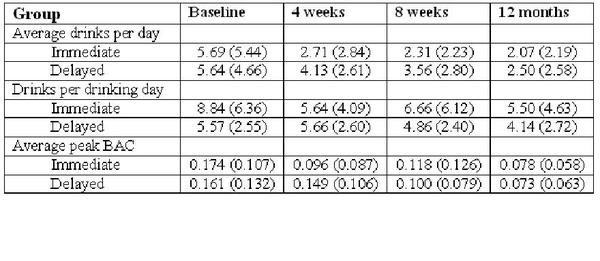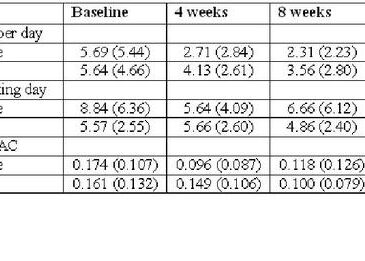Social stigma, unwillingness to admit to a problem, and many other events might make taking a step toward formal therapist-guided treatment for alcohol abuse and/or dependence too great an effort despite real need. Self-help approaches, especially those available online, might provide an alternative approach that is psychologically easier for people to consider, as well as more accessible. Online self-help resources offer more privacy and are easier to finance than formal treatment programs (Green & Fost, 1997; Havas et al., 1995). Further, more than half of the population in the U.S. has Internet access at home (U.S. Department of Commerce, 2002) and 80% of Internet users have accessed health information online (Pew Internet & American Life Project, 2003). This week The DRAM examines an article by Walters, Hester, Chiauzzi and Miller (2005) that evaluates the efficacy of alcohol self-help education programs and assessment feedback delivered exclusively online.
Evidence suggests that self-help approaches to alcoholism are effective. One article by Sanchez-Craig, Davila and Cooper (1996) evaluates the efficacy of a self-help book with and without an initial assessment. The results indicate that groups showed a reduction in drinking overall, though the Book + Assessment group achieved a larger reduction in their mean weekly consumption of alcohol at 3-months than the Book Only group. At the 12-month follow-up, a decline in past 7-day drinking represented an average 55% reduction from baseline. Both men and women reduced their drinking at comparable rates. These findings are consistent with findings from several other similar studies (Connors, Tarbox, & Faillance, 1992; Miller, Benefield, & Tonigan, 1993; Sanchez-Craig, Leigh, Spivak, & Lei, 1989;Sanchez-Craig, Spivak, & Davila, 1991).
Technological advances could make self-help even more accessible: it is more convenient and private, and thus could encourage more people to seek help. Further, depending on the evaluation materials used in online self-help tools and the branching schemes the software protocols allow, these self-help tools could provide detailed personal feedback and evaluation. This possibility holds the potential for making assessments more frequent and comprehensive without a large increase in cost.
The article by Walters et al. (2005) summarizes studies presented at the 2004 Research Society on Alcoholism Meeting, conducted in Vancouver, British Columbia, Canada. This issue of The DRAM focuses specifically on one of these summarized studies, an evaluation by Reid K. Hester of the efficacy of The Drinker’s Check-Up (DCU) (http://www.drinkerscheckup.com). The DCU is an online self-help tool based on an intervention created by Miller et al. (1988). To determine the efficacy of a Brief Motivational Intervention (BMI) self-help resource when delivered via the Internet, Hester (Walters et al., 2005) conducted randomized trials using the DCU. The DCU includes an introduction and screening section, modules for assessment, individualized feedback, and motivational enhancement exercises; for those who decide that they would like to change their drinking behavior, DCU provides a template for a “Change Plan” based on the Motivational Enhancement Therapy part of Project MATCH (Miller, Zweben, DiClemente, & Rychtarik, 1995). For this study, 61* problem drinkers were randomly assigned to one of two groups: the experimental group (35 people; 57% of the group) started the DCU program immediately, and the control group (26 people; 43% of the group) started after a delay of 4 weeks.

Figure. Means and (standard deviation) on drinks per drinking day for both groups at four time periods (adapted from Walters et al., 2005). Click image to enlarge.
Both groups reduced drinking significantly in the first 4 weeks after starting DCU; both groups also continued to improve even after the end of treatment. At 12 months both groups had reduced their drinking by approximately 50% from baseline. These results are comparable to results of the DCU delivered in face-to-face interventions (Burke, Arkowitz, & Dunn, 2002), suggesting that Internet based self-help tools are a powerful resource for people who wish to reduce their drinking. Brief motivational interventions (BMIs) delivered in person and now online, such as the DCU, are among the most empirically supported approaches to reducing alcohol use and have proven effective across a range of populations and settings (Walters et al., 2005, p. 270).
With this evidence base in mind, the BASIS presents Your First Step to Change: Drinking, a new addition to the series Your First Step to Change. This self-help series was introduced during the summer of 2003; we created the first toolkit to address problem gambling. These toolkits are designed to help people (1) gain information about addiction-related problems, (2) evaluate their own addiction-related behavior, and (3) develop change strategies, should they decide that change is the best course. The drinking toolkit includes three separate sections: (1) Facts About Alcohol, which provides information about alcohol consumption more generally and also with particular situations in mind; (2) Understanding Your Drinking, which includes three questionnaires designed to identify different areas of problem drinking for each participant; and (3) Thinking About Change, which guides a person as s/he makes a plan for change, should that be the right decision for the participant. This is available free of charge to the general public. We hope the format of these online toolkits will provide people with their drinking an opportunity to evaluate and change their drinking.
What do you think? Please use the comment link below to provide feedback on this article.
________________
*A total of 141 people volunteered for this study. Of the volunteers, 83 completed an in-person screening. The 22people who participants who did not go through the baseline assessment after the in-person screening were excluded.
References
Burke, B. L., Arkowitz, H., & Dunn, C. (2002). The efficacy of motivational interviewing and its adaptations: What we know so far. In W. R. Miller & S. Rollnick (Eds.), Motivational interviewing: Preparing people to change, 2nd ed. (pp. 217-250). New York: Guilford Press.
Connors, G. J., Tarbox, A. R., & Faillance, L. A. (1992). Achieving and maintaining gains among problem drinkers: Process and outcome results. Behavior Therapy, 23, 449-474.
Green, M. J., & Fost, N. (1997). An interactive computer program for educating and counseling patients about genetic susceptibility to breast cancer. Journal of Cancer Education, 12, 204-208.
Havas, S., Heimendinger, J., Damon, D., Nicklas, T. A., A., C., Beresford, S. A., et al. (1995). Five-A-Day for betterhealth. Public Health Reports, 110, 69-79.
Miller, W. R., Benefield, R. G., & Tonigan, J. S. (1993). Enhancing motivation for change in problem drinking: A controlled comparison of two therapists’ styles. Journal of Consulting and Clinical Psychology, 61, 455-461.
Miller, W. R., Zweben, A., DiClemente, C. C., & Rychtarik, R. G. (1995). Motivational Enhancement Therapy Manual. In Project MATCH Monograph Series, Vol. 2. Rockville, MD: National Institute on Alcohol Abuse and Alcoholism.
Pew Internet & American Life Project. (2003). The Online Health Care Revolution. Washington, DC: Pew Internet & American Life Project.
Sanchez-Craig, M., Davila, R., & Cooper, G. (1996). A Self-Help Approach for High-Risk Drinking: Effect of an Initial Assessment. Journal of Consulting and Clinical Psychology, 64(4), 694-700.
Sanchez-Craig, M., Leigh, G., Spivak, K., & Lei, H. (1989). Superior outcome of females over males after brief treatment for the reduction of heavy drinking. British Journal of Addiction, 84, 395-404.
Sanchez-Craig, M., Spivak, K., & Davila, R. (1991). Superior outcome of females over males after brief treatment forthe reduction of heavy drinking: Replication and report of therapists effects. British Journal of Addiction, 86, 867-
876.
U.S. Department of Commerce. (2002). A nation online: How Americans are expanding their use of the Internet. Washington DC: Economics and Statistics Administration, National Telecommunications and Information
Administration.
Walters, S. T., Hester, R. K., Chiauzzi, E., & Miller, E. (2005). Demon Rum: High-Tech Solutions to an Age-Old Problem. Alcoholism: Clinical & Experimental Research, 29(2), 270-277.




